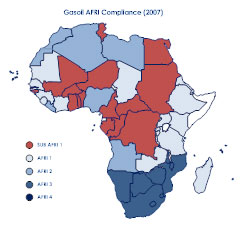Africa after “Dirty Diesel”: Towards Harmonised Specifications and Cleaner Air
In the 10 years since lead was successfully removed from gasoline in Sub-Saharan Africa, the attention of governments, regulators and campaigners has moved to other pollutants, notably sulphur and benzene. As well as tightening specifications, the desirability of establishing harmonised specifications across sub-regions is widely recognised as a way to foster intra-regional trade and traffic.
Despite the best efforts of UNEP, the ARA and various NGOs, the message of the benefits that clean air brings to the population at large has been lost amidst the short-term noise over increasing pump prices and the introduction of emission controls on vehicles. But while the goal of universal compliance with the ARA’s AFRI 4 specification by 2020 seems unlikely to be met, the situation now shows significant improvement compared to 10 years ago.
Forging ahead
Over the last five years there has been a change in the dynamics of specifications policy: where Southern Africa was in pole position before, it is now the Indian Ocean states that are leading the way. There are three main reasons for this: the strength of the East African Community, the world scale export refineries built in India and Saudi Arabia, and the absence of any refining sector in the region.



 The story elsewhere
The story elsewhere
There appears to be significant progress on improving gasoil quality in southern Africa, but the planned move to 10ppm for both gasoline and gasoil in South Africa has stalled for now, with consequences for the entire region. Meanwhile, West Africa is faced by the most complex downstream environment in Africa and the variety of specifications policies and supply chains is enormous. There has been some progress on tightening specifications, but there has been no effective collaboration.
The big picture
Recent attempts to tighten and harmonise specifications throughout Sub-Saharan Africa have shown that there are many necessary elements for success, but two that are absolutely essential: a strong supranational body to promote and coordinate change, and a clear government strategy on whether to fund the necessary refinery investments to produce clean fuels.
by Richard Augood, October 2017
Purchase this downstream insight
